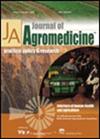Precarious Work and Housing for Michigan Farmworkers During the COVID-19 Pandemic and Beyond.
IF 2.1
3区 医学
Q3 PUBLIC, ENVIRONMENTAL & OCCUPATIONAL HEALTH
引用次数: 0
Abstract
OBJECTIVES Farmworkers in Michigan face precarious and exploitative labor conditions that affect their access to affordable, fair, and quality housing, which are key social determinants of health. We sought to assess the health, working conditions, and housing access, affordability, and quality of farmworkers living in and outside of employer-provided housing during the COVID-19 pandemic. METHODS We conducted a mixed methods cross-sectional study in collaboration with community partners from the Michigan Farmworker Project and the Michigan Department of Civil Rights. We assessed housing, labor conditions, and general health through in-depth phone interviews with seasonal, migrant, and H-2A farmworkers (n = 63) during the height of the COVID-19 pandemic (2020-2021) in Michigan. Descriptive analyses of these data included comparisons by type of farmworker and type of housing (employer-provided or other). RESULTS The majority of farmworkers interviewed were women and seasonal farmworkers and spoke primarily Spanish. A significant share of farmworker participants reported living in poverty (38.3%) and had low or very low food security (27.0%). Nearly half of farmworkers (47.6%) rated their health as "fair" or "poor" during the year prior to the interview, and more than a third reported 3 or more chronic conditions (39.6%) and lack of health insurance coverage (38.7%). Among the 43 workers tested, 25.6% reported testing positive for COVID-19. Farmworkers reported experiences of objectification and dehumanization. Three-quarters of workers reported feeling that they were treated as less than human by supervisors and one-third reported verbal abuse. Farmworkers also experienced challenges exacerbated by their social vulnerability that impeded them from finding affordable, quality housing. Regarding housing quality, the majority of workers (80.6%) reported one or more environmental hazards around their residence, and about a third reported not having air conditioning (33.%) and lacking a functioning washing machine (33.9%). Concerns about the quality of drinking water accessible to workers and exposure to chemicals were shared by participants. CONCLUSION This study adds valuable knowledge to the understanding of the systemic barriers to housing and work conditions for female and male seasonal, migrant, and H-2A farmworkers in Michigan. Shortcomings in the regulatory and policy environment result in precarious housing and work conditions, including exploitative labor practices. These conditions negate equality, fairness, and health equity, important tenants for public health.密歇根州农场工人在 COVID-19 大流行期间及其后的不稳定工作和住房。
目标密歇根州的农民工面临着不稳定和受剥削的劳动条件,这影响了他们获得负担得起、公平和高质量的住房,而这些住房是健康的关键社会决定因素。我们试图评估在 COVID-19 大流行期间居住在雇主提供的住房内和住房外的农民工的健康状况、工作条件以及住房的可获得性、可负担性和质量。我们通过对密歇根州 COVID-19 大流行期间(2020-2021 年)的季节性工人、移民和 H-2A 级农民工(n = 63)进行深入电话采访,评估了他们的住房、劳动条件和总体健康状况。对这些数据进行的描述性分析包括按农民工类型和住房类型(雇主提供或其他)进行比较。相当大比例的受访农民工表示生活贫困(38.3%),食品安全程度较低或非常低(27.0%)。近一半的农民工(47.6%)在受访前一年将自己的健康状况评为 "一般 "或 "差",超过三分之一的农民工报告有 3 种或更多的慢性病(39.6%),并且没有医疗保险(38.7%)。在接受检测的 43 名工人中,25.6% 报告 COVID-19 检测呈阳性。农民工报告了被物化和非人化的经历。四分之三的工人报告称,他们感觉自己被主管视为非人,三分之一的工人报告称受到辱骂。农民工还经历了因其社会弱势地位而加剧的挑战,这阻碍了他们找到负担得起的优质住房。在住房质量方面,大多数工人(80.6%)称其住所周围存在一种或多种环境危害,约三分之一的工人称没有空调(33.0%),也没有正常运转的洗衣机(33.9%)。这项研究为了解密歇根州男女季节性工人、移民和 H-2A 级农场工人在住房和工作条件方面的系统性障碍提供了宝贵的知识。监管和政策环境的缺陷导致了不稳定的住房和工作条件,包括剥削性的劳动实践。这些条件否定了平等、公平和健康公平,而这些都是公共健康的重要条件。
本文章由计算机程序翻译,如有差异,请以英文原文为准。
求助全文
约1分钟内获得全文
求助全文
来源期刊

Journal of Agromedicine
PUBLIC, ENVIRONMENTAL & OCCUPATIONAL HEALTH-
CiteScore
4.10
自引率
20.80%
发文量
84
审稿时长
>12 weeks
期刊介绍:
The Journal of Agromedicine: Practice, Policy, and Research publishes translational research, reports and editorials related to agricultural health, safety and medicine. The Journal of Agromedicine seeks to engage the global agricultural health and safety community including rural health care providers, agricultural health and safety practitioners, academic researchers, government agencies, policy makers, and others. The Journal of Agromedicine is committed to providing its readers with relevant, rigorously peer-reviewed, original articles. The journal welcomes high quality submissions as they relate to agricultural health and safety in the areas of:
• Behavioral and Mental Health
• Climate Change
• Education/Training
• Emerging Practices
• Environmental Public Health
• Epidemiology
• Ergonomics
• Injury Prevention
• Occupational and Industrial Health
• Pesticides
• Policy
• Safety Interventions and Evaluation
• Technology
 求助内容:
求助内容: 应助结果提醒方式:
应助结果提醒方式:


